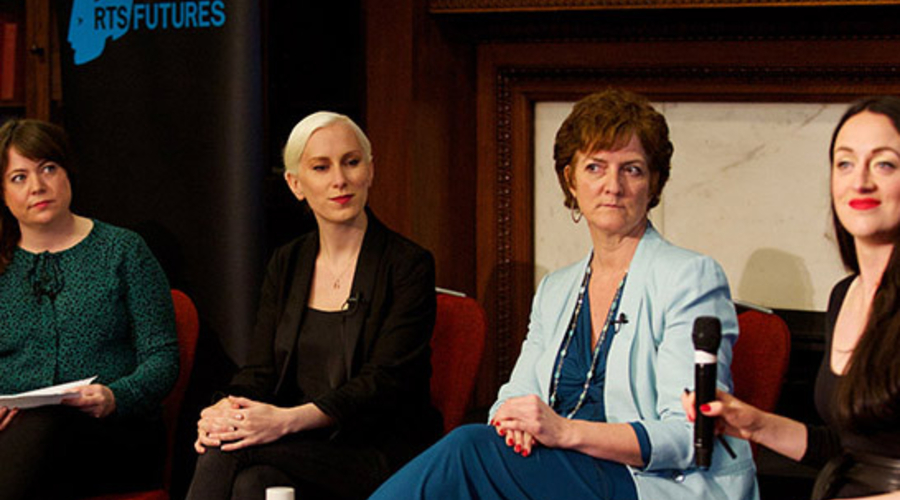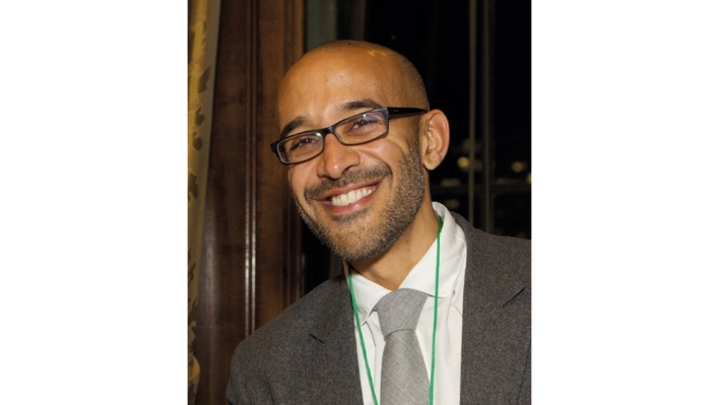Matthew Bell learns what it takes to fill the vacancies in TV's design disciplines
The UK’s reputation in the traditional TV and film crafts of make-up, costume and production design is unrivalled – and the good news is that there is no shortage of work in these areas.
That was the overwhelming conclusion of the recent RTS Futures event, “Making it in TV design”, where aspirant make-up artists and designers were given advice from a panel of industry practitioners.
Home-grown TV production is buoyant, while many US shows, such as the long-running 24 and new sci-fi seriesOutlander, are taking advantage of recently introduced tax breaks to film in the UK.
“There are not enough people feeding the industry at the minute – there’s huge demand,” said Ruth Brooks from training body Creative Skillset.
Brooks was a member of the RTS Futures panel that offered advice on how to get into, and get ahead in, art, costume and make-up departments.
The panellists, ranging from young trainees to experienced designers, were proof that there is no single way to establish a foothold in the industry.
However, they all had certain qualities in common. According to event host Alice Skidmore, who ran the BBC’s Design Trainee Scheme for five years, designers require a “combination of key skills, talent and contacts to progress”.
Costume trainee Jo Stobbs is part of Creative Skillset’s Trainee Finder initiative and has already worked onStrictly Come Dancing, BBC Four drama Burton and Taylor, and the upcoming Abi Morgan-scripted film,Suffragette.
Before joining the Skillset scheme, Stobbs had sent out countless CVs.
“At the beginning, it felt like I was shouting down a hole,” she recalled.
But she explained that any work, no matter how insignificant it seems at the time, can pay future dividends: “The two trainee jobs I’ve had have both come about from an unpaid work experience job I did three years ago.”
Sarah-Jane Prentice has climbed a few more rungs of the career ladder. While studying set and costume design at the Royal Academy of Dramatic Art, Prentice secured work experience on Mike Leigh’s Another Year after hearing the director give a talk to Rada students.
“I wrote to him and was very persistent,” she recalled. “It was a brilliant experience – he was incredibly encouraging to trainees.”
The contacts Prentice made on Another Year helped her find work when she left Rada.
“I stayed in touch with the set decorator and production designer,” she recalled. “I got my first job when I graduated through that same team.”
Prentice completed the BBC Design Trainee Scheme in 2011, subsequently working on Les Misérables and Muppets Most Wanted as a standby art director.
She has now landed the job of production designer on the new series of BBC One drama Call the Midwife.
Experienced hair and make-up designer Catherine Scoble, who numbers Lock, Stock and Two Smoking Barrels and Shane Meadows’ various This is England projects among her credits, said that aspirant designers needed determination and flexibility to succeed.
“You can’t be put off by the long hours and the early starts, and you have to adapt to many different situations and to work with many different types of people,” she said. “You have to be flexible, fluid and not set in your ways.”
Scoble, who won a Bafta for This is England ’86, added: “You can expect a good deal of rejection – I did for ages. But you have to get past that.”
More sage advice followed from Millennium FX Director Neill Gorton, a prosthetics and special effects designer who has worked on effects-heavy shows including Doctor Who and Being Human.
“Learn the craft,” he exhorted. “If you’re going to be a make-up designer, you’ve got to be a make-up artist first.
“If you’re going to be a production designer, you have to have been involved with building, painting and dressing sets.”
Keen to land what can be an elusive first job, many young designers are tempted to exaggerate their experience.
“Be really cautious about overselling yourself,” warned Skidmore. “In lots of the CVs we saw when we were running the [BBC] design scheme, people would often call themselves a designer when they’d just graduated – and they’re not.
“You have to find a way to sell yourself strongly, but very honestly.”
“I’ve got more respect for people who send me a CV that says, ‘I’m a prosthetics trainee’. The amount of times I get cards from people who’ve
just finished a course that say, ‘prosthetics designer’,” added Gorton. “People think they have to big themselves up but, if you admit your level and show you want to learn, you get much more respect.”
Agent Sara Putt highlighted the importance of possessing a “good attitude”, adding: “The hard skills will get you through the door and enable you to do the job but the soft skills are what ultimately will get you the job.
“You can be the best make-up or costume trainee in the world but if you’ve got a rubbish attitude, people aren’t going to want to work with you.”
In costume, hair and, in particular, make-up, added Bafta Crew Skills Development Manager Katie Campbell, designers are “talent-facing and [work] with the most important asset on set, which is, let’s face it, the cast. Being discreet and articulate are important soft skills.”
There is always room for new talent; in fact, Gorton argued that new blood is necessary to keep the industry in good creative health.
“It’s a freelance business and one of the beauties of this is that people move around and it keeps the creativity flowing,” he said.
“If you’ve got a workshop and new blood and imagination coming in all the time, it keeps things fresh – and that’s what an industry needs.”
‘Making it in TV design’ was an RTS Futures event held at the Hallam Conference Centre, central London, on 29 April. The producers were Don Kong and Jude Winstanley.
Question & answer
Q What can you do if you cannot afford to take unpaid work experience?
A Jo Stobbs: I couldn’t afford to. I worked full time and took holiday to do work experience… it was hard.
Q Where do you draw the line between being persistent and becoming a nuisance?
A Catherine Scoble: I had a few emails from somebody, and I was filming and so I couldn’t answer… She got angry and rude and that’s not good… I think a couple of emails is fine.
A Sara Putt: Do the research – on IMDb.com you’d find out that Catherine was busy on a show.
Q Do you have to be based in London to get work?
A Neill Gorton: It’s better to be a bigger fish in a small pond.
A Sara Putt: More than half of my established client base live outside the M25.”
A Ruth Brooks: Get your driving licence.
Q I have lots of experience in Iceland as a set designer but am finding it hard to get comparable work in the UK?
A Sara Putt: Like any transition, you’re probably going to have to go down a bit to build up… you need UK credits that people recognise.
A Sarah-Jane Prentice: Photos and visuals of your work are really important. While we may not know what your jobs are, as soon as you send a photo of something you’ve worked on it gives a visual key to show exactly what your skills are.
A Neill Gorton: That’s a very valid point… We make, mould and sculpt things: why are you sending me [just] words [on your CV] – send me pictures.
A Sara Putt: If you can’t present yourself elegantly and well visually, it’s not going to encourage somebody to use you.
A Neill Gorton: The amount of people who send me pictures taken on a phone… We’re working in high definition… It looks awful.
Q How do I build a career?
A Neill Gorton: Do anything – keep busy. You never know where a contact will come from. Even when I started in the industry, I would still work on student films… Those student film-makers are going to be the professional film-makers one day.
We can help
Creative Skillset’s Trainee Finder initiative finds paid work placements for up-and-coming talent.
‘It’s a database that helps to match people who want to be trainees in the film, TV, visual effects, animation and games industries with companies. We also provide funding for those placements,’ explained Ruth Brooks, who manages the scheme.
Trainee Finder recruits as widely as possible, aiming to bring greater diversity to the TV and film industries. It is widely accepted that unpaid work experience tends to favour people from wealthier backgrounds, who can afford to work for free.
‘We want to bring people on board from different walks of life and [to do that] we need to make sure people are paid,’ said Brooks.
‘If you get on to our database you are not guaranteed a placement, but if you do, you will be paid above the minimum wage.’
The trainees are paid by production companies, which are reimbursed for a percentage of the costs by Creative Skillset, usually 50% or 75%.
To be eligible for the scheme, trainees must have less than 12 months’ paid experience and present two references from industry professionals.
Bafta Crew is a networking and skills development initiative for production crew outside London, run by Skills Development Manager Katie Campbell. It offers online and live masterclasses from Bafta winners and nominees.
Bafta also puts on London masterclasses twice a month at the BFI and the ICA. “We run hundreds of events a year, ensuring that our winners and nominees give back to the industry, to help sustain the moving image arts,” she said.
To take part in Bafta Crew, recruits need at least four programme credits; these can be at the level of runner or assistant. ‘They need to be working in the industry. It’s the next step on from [Skillset’s] trainees scheme,’ explained Campbell.
The Neill Gorton Prosthetics Studio is a training facility associated with the prosthetics, make-up and animatronics company Millennium FX, run by Neill Gorton.
Gorton teaches both students and their lecturers. ‘I’m an employer and I try to use what I know about employing people to help jobseekers get employment,’ he explained.
Sara Putt Associates, which represents film and TV production crew, has recently set up its own trainee scheme to ‘bridge the gap between education and industry in terms of the soft skills, not the technical skills.
‘[We teach people] how to be a freelancer, how to get work, promote yourself and develop your career – because it can be a very isolating and lonely experience,’ explained Managing Director Sara Putt.
‘Any good agency helps to give a freelancer a sense of community and belonging. One of the best things that happens with the trainee scheme is that they start to network and help each other to get work,’ Putt added.
The Knowledge database contains details of thousands of UK and international production suppliers. Crew can post a basic profile and a few credits for free.
It also offers ‘how to’ e-guides, and news about upcoming productions and industry events.
The Unit List publishes job vacancies for freelancers in TV, film, digital media, corporate work and commercials. The website also offers employment advice and news.







